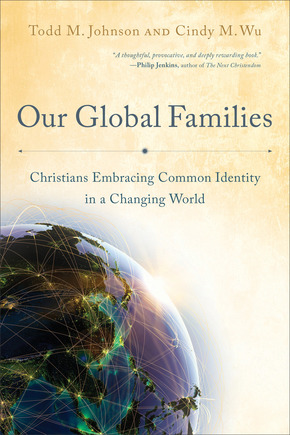 Todd Johnson and Cindy Wu have written an engaging and informative account of the current shape of ‘World Christianity’, set in the wider context of all humanity. This book will help readers to understand and engage with Christianity in all its diversity in the 21st century.
Todd Johnson and Cindy Wu have written an engaging and informative account of the current shape of ‘World Christianity’, set in the wider context of all humanity. This book will help readers to understand and engage with Christianity in all its diversity in the 21st century.
In recent years there has been a growing awareness of the growth of Christianity in the ‘Majority World’ or the ‘Global South’, even as ‘the West’ has apparently become increasingly secular. Several important studies of this phenomenon have been published in the last decade or so and the reader who wishes to learn more has plenty of material available.
So what sets this book apart? I believe that it has several distinguishing characteristics.
First, it attempts to introduce readers to the features of both the Global Church and humanity in general. The ‘Global Families’ mentioned in the title are the Global Christian Family and the Global Human Family. Throughout the book, Johnson and Wu emphasise the opportunities presented to Christians to embrace their part in both of these families. Thus, the first chapter is entitled ‘Meet your global Christian family’ and the second is entitled ‘Meet your global human family’. The first discusses significant groupings within the Christian Church worldwide and some of the issues it has to address. The second briefly introduces many of the non-Christian religious (and non-religious) beliefs found across the globe, and some possible approaches to these diverse views. Similarly, chapters are devoted to solidarity with the Global Christian Family (particularly encouraging visible expressions of unity) and with the Global Human Family (by understanding one another better). The authors encourage Christian readers to become aware of, and more engaged with, both of these global families.
Second, it is relatively up to date. Published in 2015, this is one of the most recent publications on this topic. So far as any publication can remain current in an extremely fluid situation, the details and statistics provided give a fair indication of the current situation in World Christianity. One of the authors, Todd Johnson, leads the Centre for the Study of Global Christianity at Gordon-Conwell Theological Seminary and has been engaged in gathering statistics on the Global Church for many years. The statistics that are included in this book are, therefore, current and from a reliable source.
Third, the book is intended for a general readership. Although several other books would be quite accessible to a serious reader, this book has clearly been designed to appeal to a wide variety of readers. This is evident from several features. Many chapters open with some form of personal anecdote relating to the theme of the chapter, and similar accounts of experiences are scattered throughout the text. This gives the book a personal, friendly feel. Also, the book concludes with questions for small discussion groups. This book would make an excellent basis for discussion of important topical issues.
The authors write as evangelical Christians and they address issues of solidarity, cross-cultural interaction, mission, religious dialogue, compassion, creation care from the perspective of Christian discipleship and biblical theology. That is not to suggest that all Christian readers will agree with every perspective found in the book, but I found this a well-informed, sympathetic introduction to issues that all Christians should be aware of and considering. The authors are aware of the challenge of defining a ‘Christian’ when no human can examine another’s heart. They state (5),
For the purposes of our book, we are adopting the United Nations’ definition of a Christian as one who self-identifies as such. Under this rubric, our global Christian family is made up of all who consider themselves Christians whether or not they fit into our ideals of what it means to be a Christian.
This is clearly a very inclusive definition, including many individuals and groups with radically different beliefs and practices. This definition would hardly be appropriate for membership in a local church. For the purposes of global statistics, however, there is little alternative open to researchers. Readers are given the opportunity to consider the global Church as generously as possible while also being realistic about the difference between profession of faith and true spiritual life in Christ.
Johnson and Wu urge openness and generosity to others while holding firmly to Christian convictions. One way in which this can be done is to open Christian lives and homes to others. The authors write (138),
We are exhorting Christians everywhere to practice hospitality and develop friendships with our two global families. We advocate a form of hospitality that reflects kingdom principles and has the power to transform communities. Hospitality is the key to developing friendships that promote reconciliation and unity. We must develop cross-cultural, cross-identity intelligence to equip us to do this well.
I enjoyed reading this book very much. It is sufficiently brief and clearly written to be accessible to many Christian readers. I hope Christians will take the opportunity to learn more about their Global Families from this helpful book.
For more resources on the Global Church, see these posts:
Listening to the Global Church
Global Theology – Lectures by Escobar, Sanneh, Walls and others

One thought on “Our Global Families”
Comments are closed.